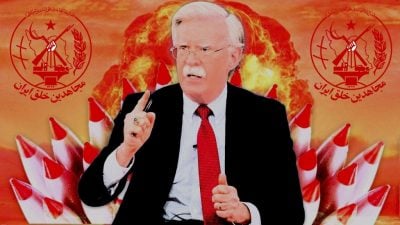Bolton’s Big Error on China and North Korea
There is almost no one alive with less credibility to advise the U.S. on what to do about North Korea’s nuclear weapons than this man.

All Global Research articles can be read in 51 languages by activating the Translate Website button below the author’s name.
To receive Global Research’s Daily Newsletter (selected articles), click here.
Follow us on Instagram and Twitter and subscribe to our Telegram Channel. Feel free to repost and share widely Global Research articles.
***
For some reason, The Washington Post lets John Bolton hold forth about China and North Korea:
Secretary of State Antony Blinken will travel to Beijing in early February to meet with his new Chinese counterpart, Qin Gang. Bilateral relations between their two countries are on shaky ground, so the agenda will be crowded.
This may seem an inopportune moment to propose North Korea as a central agenda item. But recent threatening actions from Pyongyang, including ballistic-missile testing and preparing for a seventh nuclear test, offer Blinken a good way to gauge Beijing’s sincerity about seeking Indo-Pacific peace and stability.
No other U.S. officials have done more to encourage North Korea’s nuclear weapons program than John Bolton. He has been called the “father” of their weapons program for good reason. Bolton is famous for opposing every nonproliferation and arms control agreement that has ever been negotiated or proposed, and he is responsible for killing more than a few of them, including the Agreed Framework with North Korea. His insistence on maximalist demands for North Korean disarmament at the Hanoi summit ensured the failure of the meeting and the collapse of direct talks. There is almost no one alive with less credibility to advise the U.S. on what to do about North Korea’s nuclear weapons than this man, but he somehow still gets to spout his usual hardline nonsense using one of the biggest platforms in the country.
Bolton’s op-ed is useful only in the sense that it restates and exposes some of the most flawed assumptions that have undergirded U.S. policy towards North Korea. The U.S. has erred repeatedly by exaggerating Chinese influence over North Korea and assuming that Beijing could compel North Korea into making major concessions. This is an error that Bolton himself has made many times, including during his stint as Trump’s National Security Advisor. Since leaving government, he has been banging this drum incessantly.
He keeps insisting that China could force North Korea to change, and he assumes that the only reason why China hasn’t done this is that it doesn’t want to. The possibility that China does not have the power that he credits them with never crosses his mind. Bolton badly misunderstands the relationship between China and North Korea and overstates China’s influence, and he does so at least partly so he can shift the blame for the failure of U.S. policy to China and use it as another excuse to whip up anti-Chinese sentiment.
Van Jackson explains what is wrong with this view in his new book, Pacific Power Paradox:
But it was entirely unrealistic—even ahistorical—to expect that China could use its leverage over North Korea to influence the Kim family’s decision-making. U.S. presidents going back to the 1960s had wrongly believed that either China or Russia could steer North Korean behavior. The truth was that nobody but the Kim regime determined North Korea’s course. It was a stubbornly independent country, and history had proved that China had no desire to bring too much pressure to bear on Pyongyang—not just because China feared problems on its border with North Korea if the Kim regime were to destabilize, but also because in a realpolitik kind of way, it has never made strategic sense to convert a neighboring country into an enemy if you can avoid it.[1]
All of this is lost on Bolton, who takes propaganda about the closeness of the relationship between Beijing and Pyongyang at face value and fantasizes that China could bring down the North Korean government at will if it wished it. He overrates how much power China has, and he holds them responsible for something beyond their control. Instead of facing up to the fact that North Korean disarmament is not possible, Bolton is on the hunt for a scapegoat for the mess that he helped to make.
*
Note to readers: Please click the share buttons above. Follow us on Instagram and Twitter and subscribe to our Telegram Channel. Feel free to repost and share widely Global Research articles.
Note
[1] Jackson, Pacific Power Paradox: p. 118.
Featured image is from The Iranian

